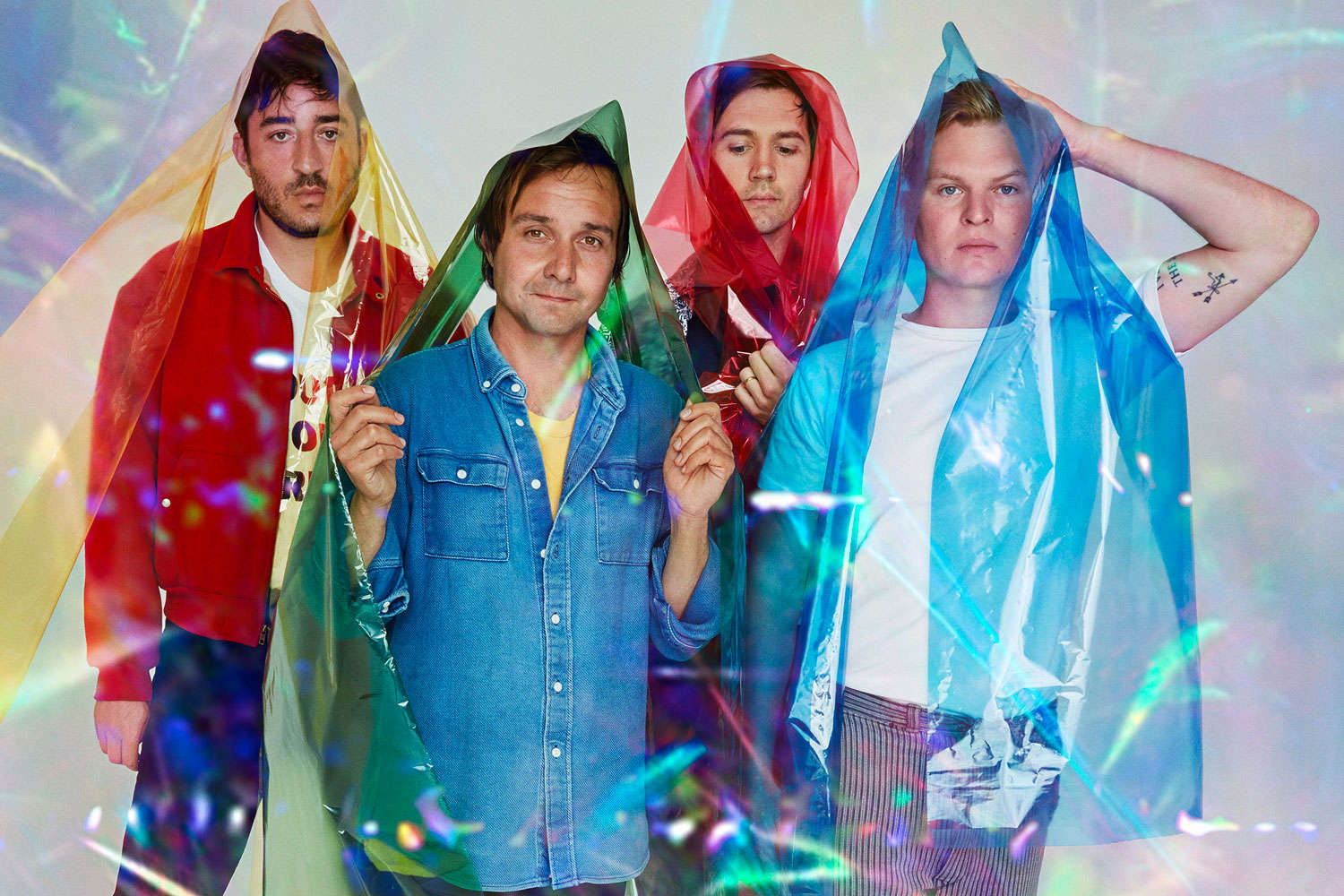Anybody who has read the liner notes of a Grizzly Bear record will know that a lot of work goes into sounding so refined. Initially founded in New York by Ed Droste as a solo effort, they’ve been hard at work for nearly 15 years perfecting their multi-instrumental sound, the gap between each album widening as they strive to develop their layers, learn new instruments and generally sharpen an approach that once earnt them the plaudit of being Johnny Greenwood’s ‘favourite band in the world’.
It’s a process that is highly democratic – a gang of highly trained players, all four members chip in to the music at it every juncture, from the demoing stage right through to press junkets and social media management. “I think it is something that’s weirdly unusual,” explains Chris Taylor. “I dunno, many bands now are just one person writing all the music, but definitely with us, all four of us have the tools the means to contribute in different ways. I find it to be a real luxury to have lots of ideas there. We all tend to agree when the right course of action has been presented, which is good.”
Steering themselves onto that right course of action though did take the self-confessed prodding of one particular member. Taylor, who has played on and produced every Grizzly Bear effort since 2006’s breakthrough ‘Yellow House’ willingly admits that it was him who fought so vigilantly to keep the band together as the commitments of ‘real life’ began to kick in after an extensive touring cycle for 2012’s ‘Shields’.
“I remember speaking with at least Chris [Bear] and Ed [Droste] after our last ‘Shields’ show in Sydney,” he recalls. “We had a great last show, and we were all hanging out afterwards on a bit of a high. I took the opportunity to be like, ‘Cool, now we’re feeling good, maybe we should check in with each other in like three months and talk about music, keep it light and low pressure and whatever’. I just know that when we break communication and go into our separate corners of existence, we can become quite disparate and uncommunicative with each other just by way of doing our own thing. I was ready and raring to go right away, but I had to accept that the band wasn’t. I’m pretty restless; I need to be making stuff constantly to feel happy and satisfied. I did have to accept the idea of, what am I going to do if I’m not in a band?”
There was a period where this felt as if it would be a distinct possibility. Three months of non-communication stretched into a year as all four members kept themselves busy with various grown-up endeavours. Taylor addressed his restless side with a solo record, various production work for other bands and stints as a NOMA-trained chef; Ed Droste enjoyed a break from music entirely to focus on travelling and social activism, and Daniel Rossen became the only member to remain in New York, throwing himself into agricultural living. And then for drummer Chris Bear, there was the small matter of adjusting to first-time parenthood, something set to change the band’s dynamic completely.
“It’s going to be a very different process of going on the road and what that means from now on,” he reflects. “I’m still very excited to start playing live again, but it’s a whole new level – I’m going to be gone for three to four weeks and she’s changing by the day, it’s going to be tough to miss all of that.”
[sc name=”pull” text=”‘Album’ was a kind of forbidden word.”]
Accommodating for this new-found pace of life turned out to be a blessing in disguise; encouraged by Taylor’s insistence, sessions for ‘Painted Ruins’ began tentatively via email, each member submitting ideas without the financial or logistical restraints of committing to a rehearsal studio, or any mention of the word ‘album’.
“I think one of the things we tried to do was set it up so we were presenting ideas in a way that a was a little more casual, so sharing ideas that weren’t even finished or you wouldn’t necessarily even think to be a song yet,” says Bear. “It was nice to work in that way; it allowed for everyone to dip in on the collective songwriting that probably wouldn’t happen in we were all in the room. Sometimes you do really just need to sit with something and try lots of ideas, and that isn’t always the easiest with three other people staring at you!”

Taylor concurs. “‘Album’ was a kind of forbidden word, I didn’t want to add that pressure and ruin things for anybody in the process. After doing my best not to annoy everyone I had to come to terms with the fact that it wouldn’t be a good record if I forced anybody to do it, so I had to learn just to let it happen. That was an interesting exercise, and in the end, I think it was quite productive.” He pauses. “You have to let go of the idea of the band as an absolute thing. It never was, and I never thought it was, but I guess I always felt like there was more for us to do and I wasn’t satisfied for this to be the end. But I think it helped; by accepting the possibility that we might not have a future made me appreciate the whole process a lot more, I think it made for a more open-minded creative environment which was a lot more fun. Yeah, I’m pretty glad I prodded!”
[sc name=”pull” text=”I always felt like there was more for us to do; I wasn’t satisfied for this to be the end.”]
A record of complex emotions, ‘Painted Ruins’ is a Grizzly Bear album as it should be: lush instrumentation and a wide lyrical span that keeps things humbly vague but undeniably touches on some key moments of the past five years – Droste’s divorce, Bear’s new fatherhood, growing older and apart while also trying to negotiate this strange new world we find ourselves in under the Trump administration (Grizzly Bear were vocal supporters of the Bernie Sanders campaign). On the cusp of this new frontier, the narrative of their music has significantly changed.
“I know the guys so well that I can hear in the lyrics that there is a different perspective this time,” Taylor observes. “To me, it’s about that slice of life when you’re in your mid-thirties, and you start to assess the fact that you’re definitely not a kid anymore. It almost feels like the beginning of adult life in a way where it’s quite natural to stop and assess the path behind you and the path ahead. I feel like with ‘Shields’ we were all introspectively searching for answers to define certain concepts and sharpen tools, and I think this album, in contrast, is just playing with those tools; not seeking to repair them, but to just make use them as they are. Just enjoying what we’ve got and the possibilities we have. There was a very different headspace with this record.”
“To me, it feels ambitious and playful,” agrees Bear. “Obviously there’s still all of the multilayers and intricate parts going on, and although most of it wasn’t done live, we tried to still capture some kind of live rhythm section energy and have it feel energetic. I think it came through; I guess it feels pretty colourful to me. These are pretty exciting times!”
Taken from the September issue of Dork. Order a copy below. Grizzly Bear’s album ‘Painted Ruins’ is out 18th August.





